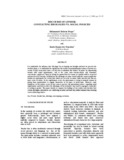| dc.contributor.author | Haque, Muhammed Shahriar | |
| dc.contributor.author | Chandran, Sanda Kumari D/O | |
| dc.date.accessioned | 2010-10-13T08:44:08Z | |
| dc.date.available | 2010-10-13T08:44:08Z | |
| dc.date.issued | 2004 | |
| dc.identifier.uri | http://hdl.handle.net/10361/497 | |
| dc.description.abstract | It is undeniable the influence that ‘ideology’ has in shaping our thoughts and how we perceive the world at large, as is undeniable the significant role it plays in maintaining the balance of power in a
society. It may seem ironic how a society tries to maintain this balance of power by empowering women with equal opportunities, and at the same time—unconsciously and sometimes consciously—suppresses them by taking for granted that the norms of equality will be respected and practiced by everyone. In Malaysia, the ideologies in some school textbooks seem to imply that
women are appropriate for certain jobs which are recessive in nature while men for jobs that are more active in nature. In the employment sector, the government is trying to promote women by giving them opportunities to engage themselves in all types of professions. However, some
employees in the private sector do not seem to practice the government polices regarding equal opportunities and tend to reflect the ideologies of the textbooks: they tend to segregate certain jobs according to gender. This paper intends to compare the findings of two studies and elucidate how certain ideologies and policies are conflicting in nature and how they inhibit women from choosing career-advancing choices. | en_US |
| dc.language.iso | en | en_US |
| dc.publisher | BRAC University | en_US |
| dc.relation.ispartofseries | BRAC University Journal, BRAC University;Vol.1, No.2,pp. 21-32 | |
| dc.subject | Gender | en_US |
| dc.subject | Bias | en_US |
| dc.subject | Ideology | en_US |
| dc.subject | Stereotyping | en_US |
| dc.subject | Exclusion | en_US |
| dc.title | Discourse of gender: conflicting ideologies vs. social policies | en_US |
| dc.type | Article | en_US |

